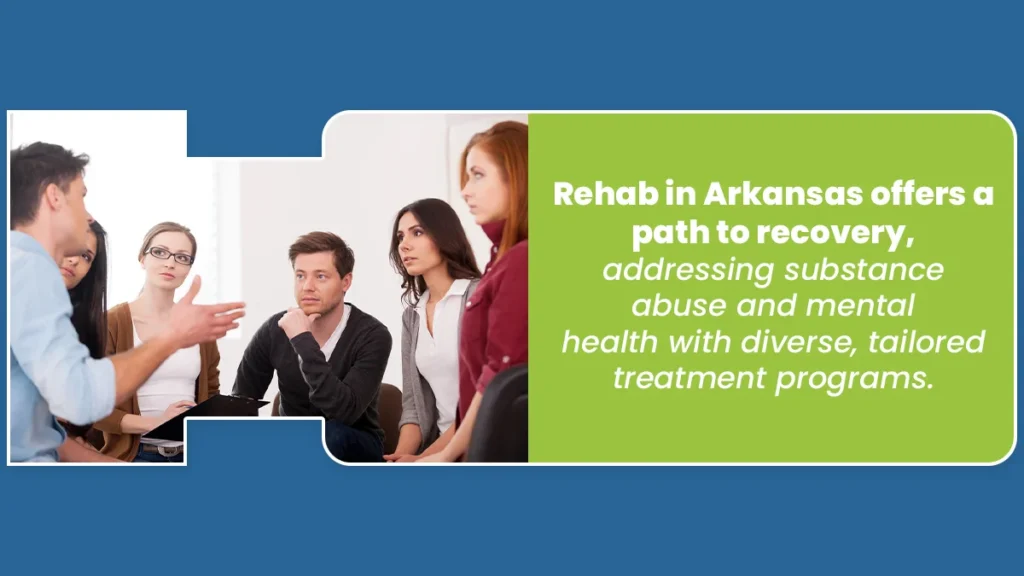Rehabilitation in Arkansas plays an essential role in addressing substance abuse and mental health challenges. The state recognizes the importance of providing effective support and treatment to individuals seeking recovery.
Arkansas offers a diverse array of treatment programs catering to various needs. This article will delve into the available treatment options, ensuring the residents of Arkansas can make informed decisions for themselves or their family members.

Key Takeaways
The state of Arkansas recognizes the importance of providing effective treatment to individuals seeking recovery. Here is what this article covers:
- Rehabilitation in Arkansas is pivotal in breaking the cycle of substance addiction and mental health struggles.
- Arkansas rehab centers offer diverse treatment options, ensuring individuals find tailored support for their recovery.
- When choosing a rehab center in Arkansas, it is essential to consider different factors for a tailored and effective recovery.
Take the first step towards lasting recovery at The Haven Detox-Little Rock. Contact (501) 271-3342 to learn about treatment options.
The Importance of Rehab in Arkansas
In the vibrant state of Arkansas, or AR, the importance of rehab services cannot be overstated. These crucial programs address two major challenges – substance abuse and mental health.
Substance Abuse Treatment
Rehabilitation programs in Arkansas play a pivotal role in the fight against drug and alcohol use disorders. By providing structured support and evidence-based treatment interventions, these programs empower individuals to overcome drug and alcohol addiction. Addressing the root causes and offering coping mechanisms, rehabilitation helps break the cycle of substance use disorder (SUD), fostering healthier individuals and communities.
Mental Health Treatment
Beyond drug and alcohol abuse, rehab in Arkansas addresses the critical aspect of mental health. By recognizing the interconnectedness of mental well-being and addiction, these treatment programs offer comprehensive support. Through counseling, therapy, and psychiatric care, individuals receive the necessary tools to address mental health disorders, promoting lasting recovery and improved overall quality of life.
By offering comprehensive care, support, and education, rehabilitation centers in Arkansas contribute significantly to the well-being of individuals and communities.
Types of Rehab Centers in Arkansas
In Arkansas, as in many other states in the US, there are various types of rehab centers catering to different needs and preferences. Here are some common types:
Inpatient Rehab Centers
Inpatient drug rehab centers, often referred to as residential treatment facilities, provide a structured and immersive environment for individuals dealing with severe substance abuse or mental health issues. Patients residing within the facility receive around-the-clock care, counseling, and therapeutic interventions. This intensive approach benefits those requiring a focused, distraction-free setting to address their challenges.
Outpatient Rehab Centers
Outpatient rehab centers offer flexibility, allowing individuals to attend treatment sessions while continuing their daily lives. Outpatient services, including a partial hospitalization program (PHP) and intensive outpatient program (IOP), are suitable for those with milder drug abuse issues or those transitioning from inpatient care. Outpatient treatment programs include counseling, group therapy, and educational sessions, providing support without needing residential stays.
Specialty-Specific Rehab Centers
Specialty-specific rehab centers cater to specific needs, such as dual diagnosis, LGBTQ+ community, veterans, or gender-specific programs. These facilities recognize certain groups’ unique challenges and provide specialized care to address these nuances effectively. By tailoring treatment to specific demographics or issues, these recovery centers enhance the chances of successful recovery.
Faith-Based Rehab Centers
Faith-based rehab centers integrate spiritual and religious components into the rehabilitation process. These centers often incorporate faith-based counseling, prayer, and community support. For individuals seeking a holistic approach that aligns with their religious beliefs, faith-based rehab centers offer a supportive environment to foster recovery.
When considering rehab options, Arkansas residents should carefully assess their needs, preferences, and the severity of their addiction to determine the most suitable level of care for their situation.
Understanding the Rehab Process in Arkansas
The rehabilitation process in Arkansas typically follows a structured approach to address substance abuse and mental health challenges. Here is an overview of the key components of the rehab process:
Assessment and Evaluation
The rehabilitation journey starts with a thorough assessment and evaluation, providing a personalized starting point for each individual. Experienced professionals assess the extent of substance abuse, mental health conditions, and any co-occurring disorders. This step is crucial for tailoring an effective treatment plan that addresses the particular needs and challenges of the individual.
Detoxification Process
Medical detoxification is a pivotal stage where the body rids itself of the substance and undergoes withdrawal. Under the medical supervision of the treatment team, individuals are supported through this challenging phase, ensuring safety and minimizing discomfort. The detox services set the stage for subsequent therapeutic interventions by creating a foundation of physical stabilization.
Behavioral Therapy and Counseling
Behavioral therapy and counseling form the core of rehab, offering individuals the tools to address the psychological aspects of addiction. Cognitive behavioral therapy (CBT), motivational interviewing (MI), and group counseling provide a platform for self-reflection, skill-building, and peer support. These evidence-based approaches empower individuals to identify and modify harmful behaviors, fostering lasting positive change.
Medication-Assisted Treatment (MAT)
Medication-assisted treatment (MAT) is employed with behavioral therapy when necessary. MAT involves the use of FDA-approved medications to manage cravings and withdrawal symptoms, addressing the biological components of addiction. Careful assessment and ongoing management ensure that medications are utilized effectively and safely throughout rehabilitation.
Follow-up Prevention Programs
After the initial rehabilitation phase, Arkansas emphasizes the importance of follow-up prevention programs to support sustained recovery. Support groups like Alcoholics Anonymous (AA), outpatient counseling, and community resources offer ongoing assistance, helping individuals navigate the challenges of reintegration into daily life and providing a safety net for relapse prevention.
Lifestyle Changes and Holistic Approaches
Healthy lifestyle changes and holistic approaches are integrated into rehabilitation to promote lasting recovery. This may include promoting physical fitness, mindfulness practices, and nutritional counseling. Emphasizing overall well-being enhances individuals’ resilience and equips them with the tools to embrace a healthier and more fulfilling life.
Remember, the specifics of the rehab process can vary among treatment centers and the type of addiction or mental disorder being addressed. Individualized care is a key principle in effective rehabilitation.
Insurance and Financing for Rehab in Arkansas
When seeking rehabilitation in Arkansas, understanding the available avenues for insurance and financing is crucial. Let’s explore them:
Understanding Health Insurance
Health insurance plays a pivotal part in easing the financial burden of rehab. Many insurance plans offer coverage for substance abuse and mental health treatment. Examples of widely accepted insurance providers in Arkansas include Blue Cross Blue Shield, Arkansas Medicaid, and QualChoice. Reviewing policy details, including coverage limitations, co-pays, and deductibles, is essential to making sound decisions about the most suitable treatment options.
State-Funded Rehab Programs in Arkansas
Arkansas offers state-funded rehab programs to assist individuals who may not have private insurance coverage. The Arkansas Department of Human Services (DHS) oversees programs like the Substance Abuse Prevention, Treatment, and Recovery Services Block Grant (SUBG), aiming to enhance access to treatment services. Individuals can explore options based on their eligibility criteria and needs by contacting local DHS offices or accessing their website.
Rehab Scholarships and Grants
Financial constraints should not hinder individuals from seeking rehabilitation. Several scholarships and grants are available to offer financial assistance. One example is the Arkansas Community Foundation, which offers scholarships for addiction treatment. In addition, the Substance Abuse and Mental Health Services Administration (SAMHSA) provides grants to organizations offering substance abuse treatment services, indirectly benefiting individuals in need.
By understanding these avenues, individuals can make informed choices to ensure they receive the necessary support on their journey to recovery.
How to Find the Right Rehab Center in Arkansas
Finding the right rehab center in Arkansas or any location involves carefully considering various factors. Here are some steps to help you find a suitable rehab center:
Assess Your Needs
Begin by assessing your specific needs and goals for rehabilitation. Whether it’s overcoming substance abuse or addressing mental health concerns, understanding your unique requirements will guide you toward a facility that offers the most relevant and effective treatment.
Accreditation and Licensing
Ensure the chosen recovery center is accredited and licensed. Accreditation from organizations like the Commission on Accreditation of Rehabilitation Facilities (CARF) signifies adherence to quality standards, ensuring that the facility meets or exceeds industry benchmarks.
Treatment Approaches
Explore the treatment approaches offered by the rehab center. Whether it involves evidence-based therapies, holistic approaches, or specialized programs, understanding the methods used can help align the treatment with your preferences and needs.
Staff Qualifications
Verify the qualifications of the facility’s staff. Qualified and experienced professionals, including licensed therapists and medical professionals, contribute significantly to the effectiveness of the rehabilitation process.
Cost and Insurance
Consider the cost of treatment and the facility’s acceptance of insurance. Understanding financial aspects, such as out-of-pocket expenses and insurance coverage, helps make informed decisions that align with your budget.
Location and Environment
Evaluate the location and environment of the drug rehab center. Factors such as proximity to home, a serene setting, and a supportive atmosphere can contribute to a more comfortable and conducive recovery experience.
Aftercare and Support
Inquire about aftercare programs and ongoing support offered by the rehab center. A robust aftercare plan ensures continued support and assistance in maintaining recovery post-treatment.
Reviews and Testimonials
Read reviews and testimonials from individuals who have undergone treatment at the facility. Real-life experiences provide valuable insights into the effectiveness and quality of care provided.
By carefully considering these factors, you can navigate the process of finding a rehab center in Arkansas that aligns with your needs and sets the stage for a successful recovery.
Frequently Asked Questions (FAQ)
How do you choose the best rehab facility in Arkansas?
To choose the best rehab facility in Arkansas, assess your needs, verify accreditation, explore the best treatment approaches, check staff qualifications, consider cost and insurance, evaluate location and environment, and inquire about aftercare and support. Research reviews and testimonials for additional insights.
What are the steps to get admitted to a rehab center in Arkansas?
To get admitted to a drug and alcohol rehab center in Arkansas, assess your needs, contact the chosen facility, undergo a pre-admission assessment, provide the necessary information, verify insurance coverage, complete paperwork, and prepare for the intake process, including a physical examination and orientation.
How does a sober living home in Arkansas work?
In Arkansas, a sober living home provides a supportive, substance-free environment for individuals in recovery. Residents follow house rules, engage in peer support, attend meetings, and work towards long-term sobriety. The homes offer a transitional space promoting accountability and a substance-free lifestyle.
The Haven Detox-Little Rock: Leading the Way to Recovery
If you’re facing the challenges of drug addiction or mental health issues, know that you’re not alone, and help is available. The Haven Detox-Little Rock is your ally on the path to recovery.
The medical detox program ensures a safe cleanse from harmful toxins, setting the foundation for your healing. Our residential program is designed to provide a safe environment, fostering your journey to overcome addiction.
For those facing mental health struggles, our mental health care program stands as a beacon of hope. We employ evidence-based therapies that address the root causes, providing a comprehensive approach to mental wellness.
Wait no longer. Your path to recovery starts now. Contact us at (501) 271-3342, and let our staff members be your partner in reclaiming a healthier life.



